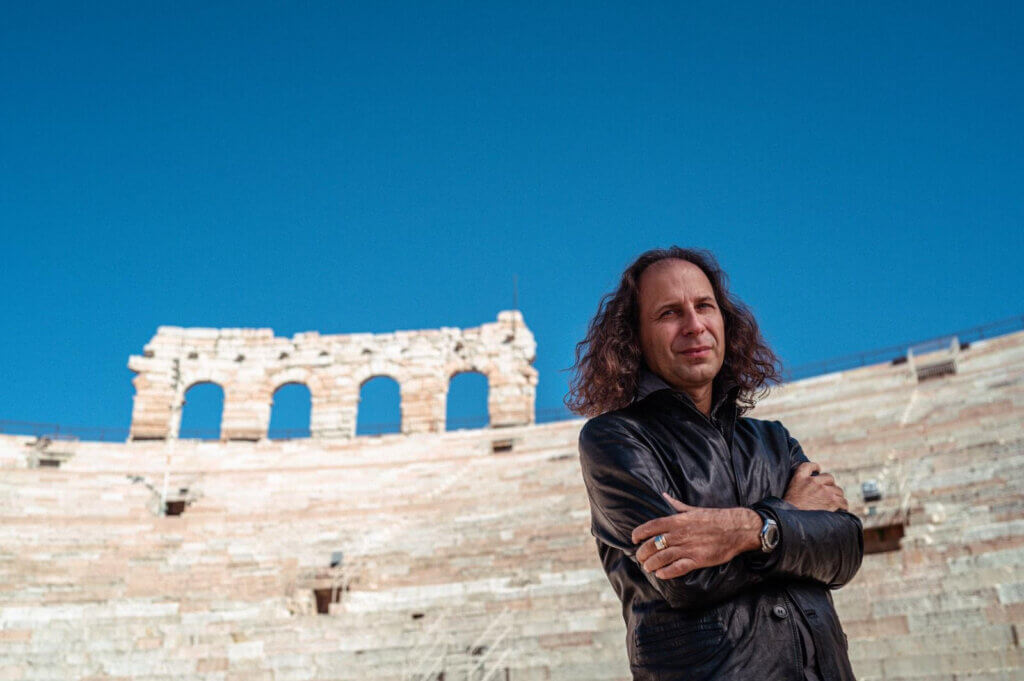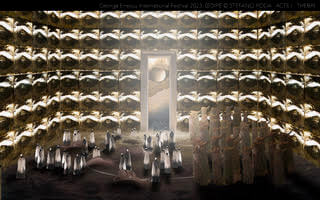Interview by Oltea Serban-Parau
O.Ş-P. – At the Bucharest National Opera in December 2023 a new production of Œdipe will première. Stefano Poda always combines direction, choreography, sets, costumes, and lighting. Will the approach to this new production share the same complex perspective?
Stefano Poda – Certainly, it is my natural approach to opera: I am not able to act differently, for I always see the stage as a real alternative world, in which unity and consistency are the key elements. This approach is due to my definition of opera as work of art: to me, opera is not entertainment, is not a rational exercise, it is not a conceptual pretext to teach lessons. It is the highest and most complex opportunity to do art: hence, I always try to perform a total work of art. Oedipe is admired and respected as a gigantic composition by the whole world: it is a lifetime opportunity to be able to approach such a masterpiece, and I designed a stage which will be a spectacular vision.

O.Ş-P. – What drew you to the proposal to stage your first production of George Enesco’s Œdipe in Bucharest? Might it be destiny? What is it that fascinates you the most in this score?
S.P. – The power of music. It is a monument of humanism, coming from Ancient Greece to the XX century, full of vision, of poetry, of genius. I find again Sophokles quotes, but all is reinvented and split between light and shadows. Oedipe is a sign of destiny, of course: I am deeply connected with the ideal of Greek tragedy, and this title is the perfect symbol of it. My dream was to perform Oedipe under the Acropolis of Athens, where I did Trovatore in 2012, but destiny was to firstly make it in the homeland of his composer: as to Greek theater I always felt curious about music in ancient times: Greek tragedy was sung, not only spoken, but we are not able to understand how was that sound, those voices, those choruses and vibrations… Enescu, as an artist, has the great power of translating that ancient world to modern ears, and making us leave a Time Machine travel… It is simply outstanding.
O.Ş-P. – You took part in a rehearsal in October. The final series of rehearsals will be in December. How was it working with conductor Tiberiu Soare and the main members of the cast?
S.P. – When I first arrived to rehearse Oedipe, I realized that in Romanian National Opera this title is like an “in-house” asset, a shared value: I was astonished because in the rest of Europe nobody would know so deeply and swiftly the score and the musical line, which is not easy. The chorus, the soloists, even the dancers were familiar with it: therefore I felt free to re-create everything in a new way, without wasting time setting the first step… It is important, even in creations, to have a common starting point! Tiberiu is indeed our center of gravity, in all this complexity: in my way of working it is fundamental to have a strong leader on the musical side. I always say that my job is to give a body (the stage) to the music, which is the soul of the performance, pure spirit: and the work must be done together between director and conductor.

O.Ş-P. – Your own language is immediately recognisable, erasing the barriers between different genres and disciplines, in order to create an all-embracing experience, a world of total art. How does this creative method translate into the reality of the opera Œdipe?
S.P. – Approaching Oedipe, I had the task of creating a repertoire performance: it means to be valid not only today, not only tomorrow, but virtually for many years, independently from personal taste. Contemporary staging aims at striking the audience with something new, without considering that nothing is new if connected to fashion: they take actuality for modernity, as unaware that what is actual today, will be ignored tomorrow. On the contrary, my language tends to forget about concrete and minor constraints, in order to discover what is universal in each score. I don’t try to make opera closer to us, I want to make us closer to opera. Art is not about teaching lessons (such as: now I will show that this title means that to us, etc. etc.), it is about creating the conditions for the audience to forget time and space, and be free to travel.
O.Ş-P. – Your career encompasses around one hundred productions staged all over the world. Your recent projects include the opening of the Centenary Arena di Verona Opera Festival 2023 with a new production of Verdi’s Aida. What is most challenging about staging a production at the Arena di Verona, a mythic space in the history of opera?
S.P. – The Arena is a unique place, made of infinite traditions. The stage itself is full of small habits which are self-evident, they must be so just because they exist. The biggest challenge is the dimension: it is hard to use all the space without invading, and still have space for the small moments. It is also a festival made at the same time for music lovers and newcomers: my mission was to create an Aide which would speak clearly to the expert as well as to the novices.

O.Ş-P. – You have authored a series of highly successful productions in the last three years, which means also during the pandemic. I’m talking about Tosca (2021) at the Bolshoi in Moscow; Dvořák’s Rusalka at the Opéra National du Capitole de Toulouse (a co-production with The Israeli Opera and Mezzo TV); Alcina (2022) and Norma (2023) at the Opéra de Lausanne; new productions of Nabucco at the Teatro Colón, Buenos Aires (2022) and to mark the reopening of the Korean National Opera (2021, 2023). What was it like working with all these famous opera houses during the pandemic?
S.P. – The pandemic involved huge troubles to the schedule: opera productions are programmed and scheduled 3-4 years in advance, and crossed re-scheduling was hard to deal with… but I must say that each theatre did the best possible effort to re-open, to re-start, to hold existing engagements, to keep supporting the performers who were left without a job. Many governments left our world behind, as if it was not a priority: I am not surprised, because even supreme and sacred moment (as birth and funerals) were left without legitimacy, out of fear. I hope we all learnt that loosing our humanity must be our only fear.
O.Ş-P. –To return to Œdipe, what special events does Stefano Poda have planned to encourage Romanian audiences to see this new production? I’m thinking of the fact that over the last thirty years there have been a number of productions of Enesco’s famous opera in Bucharest.
S.P. – Romanian National Opera is very proud of this new title: I admire general director Daniel Jinga for his total determination about going on stage with this gigantic operation, in a complex moment full of events and shows in the year of the Enescu Festival. We are planning a first premiere in December, to celebrate the ending of this year, and then a big inauguration in order to present Oedipe as a monument of national pride.

O.Ş-P. – And to return to Stefano Poda, what comes next, in 2024-25? What operas and opera houses are in store for you?
S.P. – 2024 will be very busy, as always: I am working on Rheingold, in Beijing, which is a true challenge. I will also do Tamerlano in Samarkand, which was his home land. I will do a new production of contemporary opera, in Bologna, a new creation by Alessandro Solbiati, a great friend and composer. During the summer I will also take care of Aida revival, for the festival in the Arena of Verona, otherwise I will work again in opera houses which I am deeply connected to, such as Toulouse, Lausanne, Tel-Aviv…




